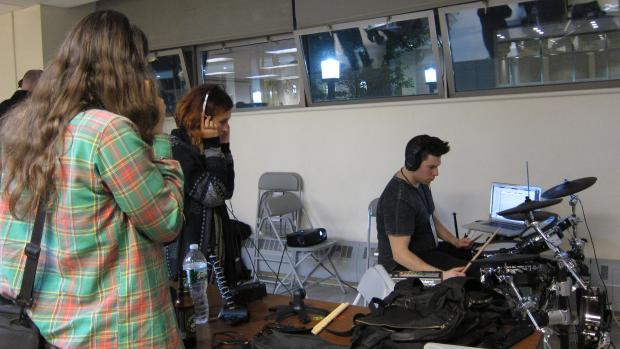Secret Sauce Revealed: Latest Version of MAX Unveiled at Expo '74

In commercial industries such as advertising, it's the "secret sauce" feeding the interactive designs of great campaigns. At least that's how Lilli Wessling-Hart, director of communications at Cycling '74, describes MAX, the visual programming language her company develops. "Commercial industries don't want to talk about it," she says, smiling.
Hart can afford a light-hearted attitude. A range of musical acts — from indie darlings Menomena to stadium-filler Coldplay and the electronic composer Aphex Twin — regularly take advantage of the suite of MAX products produced by the San Francisco-based outfit. It's also popular among artists, emerging and established alike, such as North Pitney and Kurt Ralske, who spoke at Expo '74, the three-day conference held at the Polytechnic Institute of NYU last weekend.
It was only the second time that such a conference, which focused on MAX and the projects it supports, has occurred since the firm was established in 1997 and the first time it was hosted on the East Coast. The decision to hold the conference in Brooklyn was due in part to the concentration of quality musicians and artists who call the borough home. "There are a lot of bands that are really well known here," says David Zicarelli, CEO of Cycling '74. "A lot of interesting artists work here."
Kindred Spirits
The company's ties with former employee Luke DuBois, now an assistant professor in NYU-Poly's integrated digital media program, also facilitated its decision to locate Expo '74 at the Institute, but Zicarelli identifies other factors. "Not only do they use our software to teach here," he says, "but I feel like there's a certain affinity. There's an entrepreneurial attitude."
"A lot of institutions would never do anything like this because they would want the software to be part of some kind of nonprofit or open source thing," Zicarelli continues. "The people we've been dealing with to put this on have been completely comfortable that it's commercial. We're not evil for trying to sell something."
Far from it, according to conference attendees, who numbered approximately 150 and who traveled from locales as far-flung as Singapore, Italy and France to fraternize with other MAX devotees. "This event is really fun because I get to meet a lot of other people who are in this relatively small and disparate community," says Jeff Snyder, technical director of the music studios at Princeton University and inventor of the Manta, a MAX-programmed controller for music and video.
DuBois agrees, particularly excited by the networking dimension Expo '74 offered. "It lets our students meet working professionals who have been using the software for, like, two decades who are doing really interesting stuff, some of which we show in class," he says.
The Grand Reveal
Students, like the world at large, were also introduced to the latest version of the software: MAX 6, which debuted at the conference. In addition to better animation and rendering tools, as well as other improvements, MAX 6 is the first version translated into other languages, thereby broadening the already varied community of users. "I might use it for a music thing," says DuBois, "and then meet someone who's doing something with 3-D glasses and video and I'll be like, 'Oh, I had no idea you could do that.'"
DuBois was referring to one of the presenters who participated in the Expo '74 science fair. The concept of a science fair was difficult to convey to registrants from abroad, where American-style fairs don't exist, but Hart said its inclusion was important to the company "because people's work varies so widely."
Explained Zicarelli, "That's a really important part of why we do the conference: communicating to the world that it's not about us. I hope people are saying, 'I love that other guy's work,' and they're not even thinking about the software."
Surveying the crowded science fair, which bleeped and buzzed with sounds and images created with MAX, Zicarelli concluded, "It's about our customers feeling awesome; it's not about them feeling like we're awesome."




